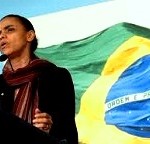President Dilma Rouseff was comfortably ensconced in her Planalto palace in Brasilia waiting to get re-elected in the elections in October. Even after massive street protests, and the shocking defeat of the Brazilian team in the World Cup – she faced strong criticism for spending more than $10 billion on the tournament – she was ahead in the opinion polls and was expected to trounce Aecio Neves, of the centre-right Social Democratic Party and Eduardo Campos of the Socialist Party.
The presidential race was fairly unremarkable until August 20, when the Socialist Party put up Marina Silva as the candidate in place of Campos who died in a plane crash the week before. Two opinion polls released in the first week of September, have predicted that Marina will win with a 7% lead over Dilma in the second round of elections. The Dilma camp which has been working on her re-election campaign for the last four years is shocked by this ambush from the Amazon-born activist.
The prospect of Marina’s win has come as a boon to the middle class which has been protesting for the last two years against poor public services, price rise and corruption scandals involving Dilma’s Workers’ Party (PT). Marina is perceived as a principled, anti-establishment outsider by protestors. Her clean image sets her apart from the PT whose top leaders have been convicted on corruption charges. The business community, which found Dilma inaccessible, has quickly latched on to the winning camp. They believe in Marina’s transformation from the idealist activist to a pragmatic political leader. Marina has already declared that she will be a one-time president and not seek reelection. This is a clever message to the supporters of Lula who has thrown his hat in the ring for 2018. Marina has thus gained the support of the poor, middle-class and business – dipping into the vote banks of Dilma and Neves.
Marina’s humble origins resonate with the poor. One of 11 children born in a poor rubber tapping community in the Amazonian village of Acre, she was orphaned at the age of 16. She survived malaria, hepatitis and other diseases. Eventually raised by nuns, she learned to read only when she was a teenager. She joined the rubber tappers’ union and worked with the famous Chico Mendes whose movement worked for the protection of the Amazon. She joined the PT in 1986 and was elected as deputy in the State Assembly in 1990, and became Federal Senator in 1994. She was the minister of environment in President Lula’s cabinet between 2003-8 – a post she resigned from when her passionate environmentalism collided with vested interests and she lost out on Lula’s support.
Marina fought the 2010 elections as a candidate of Green Party and came third in the race with an impressive 19.3 % of votes. She tried to launch a party of her own called the Sustainability Network but it did not take off. In 2013, she joined the Socialist Party and agreed to be the vice-presidential candidate with Campos.
If elected, Marina is likely to continue with the inclusive social policies of the current government, since she is also a leftist like Lula and Dilma. But she might give more space to private sector business which felt stifled under Dilma. Brazilian stock and bond markets have already started a bullish run anticipating Marina’s win.
Brazilian foreign policy has remained passive in the last four years as Dilma took little interest in external affairs. But Marina is committed to raise the profile of Brazil. She gives importance to regional integration, South-South cooperation, improvement of relations with the U.S., signing of trade agreements with Europe and innovative Brazilian leadership initiatives in global climate change policies. She is likely to be less vocal in supporting Iran, Cuba and Venezuela.
Prime Minister Modi might find Marina more amiable and proactive than Dilma in strengthening the bilateral strategic partnership and enhancing cooperation in IBSA, BRICS and other multilateral forums.
Ambassador R. Viswanathan is Distinguished Fellow, Latin America Studies, Gateway House. He is the former Indian Ambassador to Argentina, Uruguay, Paraguay and Venezuela, and Consul General in Sao Paulo.
This blog was exclusively written for Gateway House: Indian Council on Global Relations. You can read more exclusive content here.
For interview requests with the author, or for permission to republish, please contact outreach@gatewayhouse.in.
© Copyright 2014 Gateway House: Indian Council on Global Relations. All rights reserved. Any unauthorized copying or reproduction is strictly prohibited


